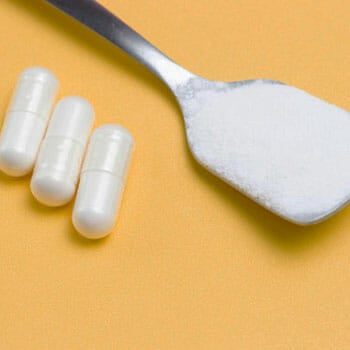Creatine Ethyl Ester is one of the six forms of creatine and is taken in smaller dosages with similar effects to other forms of creatine.
It is one of six most popular forms of creatine. Many athletes prefer it to other forms of creatine because it can be taken in smaller doses with similar effects.
And since it enters the cells that form muscle tissue more effectively than other creatine supplements, it provides the user with superior muscle-building benefits.
Quick Summary
- Creatine Ethyl Ester (CEE) is a modified form of creatine designed to enhance its solubility, permeability, and pharmacodynamics.
- This dietary supplement helps build muscle mass, improve your performance, and power.
- According to insights from the BioMed Central (BMC) study, creatine ethyl ester is easier on the stomach than creatine monohydrate.
- In my opinion, it's essential to consider personal experiences and responses when selecting a creatine supplement, as each person's body may respond differently to specific formulations.
Is Creatine Ethyl Ester Dangerous?

According to the National Center for Biotechnology Information's (NCBI) study, manufacturers of CEE claim that its enhanced permeability makes it superior to other forms of creatine and able to bypass the creatine transporter, however, there is no published evidence to support these claims and its effectiveness is yet to be adequately researched [1].
However, most users find it to be much gentler on the stomach compared to creatine monohydrate when it comes to supplementing with creatine when taken as directed.
As long as your kidneys are healthy and function normally, you shouldn’t experience any severe side effects while using creatine ethyl ester cee.
Naturally, your body will need lots of water and moderate exercise to burn off the extra creatine supplements you consume.
This helps convert creatine ethyl ester into adenosine triphosphate — key for your muscle system working effectively.
How Pure It Is?

After conducting experiments with it, I've come to realize that assessing the purity of Creatine Ethyl Ester (CEE) can be challenging, as it is usually derived from breaking down more complex creatine forms.
Per a 2015 study published in the National Center for Biotechnology Information (NCBI), creatine ethyl ester (CEE) is a form of creatine that has been modified to improve its solubility, permeability and pharmacodynamics [2].
However, all types of creatine are mass-manufactured, so some brands may use more pure CEE than others.
But, you'll have to check the product label or contact the manufacturer to get the details on its purity.
Pure creatine ethyl ester is much easier to absorb than other creatine groups.
Is It Better than Creatine Monohydrate?

Based on my extensive research, I have found that Creatine Ethyl Ester (CEE) is not necessarily better or worse than other creatine types. Researchers report that:
“Creatine ethyl ester did not show any additional benefit to increase muscle strength or performance than creatine monohydrate or maltodextose placebo. Additionally, total body mass, fat mass, fat-free mass, and thigh muscle mass were not significantly enhanced with creatine ethyl ester supplementation compared to placebo or creatine monohydrate groups.”
- Mike Spillane, Ryan Schoch, Matt Cooke, Travis Harvey, Mike Greenwood, Richard Kreider & Darryn S Willoughby
Some people find that certain supplement types work better for muscle building than others.
We know that taking creatine typically results in water retention and bloating. According to insights from the BioMed Central (BMC) study, even though research has proven that creatine ethyl ester is easier on the stomach than creatine monohydrate [3], it doesn't cause side effects as commonly as creatine monohydrate.
Moreover, it's richer in amino acids. We need to remember that each body is unique and responds differently to specific formulations.
References:
- www.ncbi.nlm.nih.gov/pmc/articles/PMC2649889/
- www.ncbi.nlm.nih.gov/pmc/articles/PMC4469200/
- https://jissn.biomedcentral.com/articles/10.1186/1550-2783-6-6
About The Author
You May Also Like






